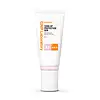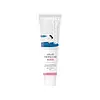What's inside
What's inside
 Key Ingredients
Key Ingredients

 Benefits
Benefits

 Concerns
Concerns

 Ingredients Side-by-side
Ingredients Side-by-side

Water
Skin ConditioningCyclopentasiloxane
EmollientEthylhexyl Methoxycinnamate
UV AbsorberEthylhexyl Salicylate
UV AbsorberZinc Oxide
Cosmetic ColorantCyclohexasiloxane
EmollientButylene Glycol
HumectantPEG-10 Dimethicone
Skin ConditioningCI 77891
Cosmetic ColorantMethyl Methacrylate Crosspolymer
Dipropylene Glycol
HumectantEthylhexyl Palmitate
EmollientDimethicone/Vinyl Dimethicone Crosspolymer
Skin ConditioningPelargonium Graveolens Flower Oil
MaskingSea Water
HumectantCamellia Sinensis Leaf Extract
AntimicrobialPinus Pinaster Bark Extract
AntioxidantVitis Vinifera Seed Extract
AntimicrobialPortulaca Oleracea Extract
Skin ConditioningPearl Powder
Tourmaline
Caprylyl Methicone
Skin ConditioningCetyl PEG/PPG-10/1 Dimethicone
EmulsifyingDicaprylyl Carbonate
EmollientMagnesium Sulfate
Polymethylsilsesquioxane
Disteardimonium Hectorite
StabilisingIsoamyl P-Methoxycinnamate
UV AbsorberVinyl Dimethicone/Methicone Silsesquioxane Crosspolymer
C30-45 Alkyl Cetearyl Dimethicone Crosspolymer
EmollientAluminum Hydroxide
EmollientStearic Acid
CleansingGlyceryl Caprylate
EmollientDimethicone
EmollientCaprylyl Glycol
EmollientHydroxyapatite
AbrasivePanthenol
Skin ConditioningTriethoxycaprylylsilane
Montmorillonite
AbsorbentBiosaccharide Gum-4
Skin ConditioningThioctic Acid
AntioxidantUbiquinone
Antioxidant1,2-Hexanediol
Skin ConditioningPhenoxyethanol
PreservativeCitronellol
PerfumingGeraniol
PerfumingCitral
PerfumingCI 77492
Cosmetic ColorantCI 77491
Cosmetic ColorantWater, Cyclopentasiloxane, Ethylhexyl Methoxycinnamate, Ethylhexyl Salicylate, Zinc Oxide, Cyclohexasiloxane, Butylene Glycol, PEG-10 Dimethicone, CI 77891, Methyl Methacrylate Crosspolymer, Dipropylene Glycol, Ethylhexyl Palmitate, Dimethicone/Vinyl Dimethicone Crosspolymer, Pelargonium Graveolens Flower Oil, Sea Water, Camellia Sinensis Leaf Extract, Pinus Pinaster Bark Extract, Vitis Vinifera Seed Extract, Portulaca Oleracea Extract, Pearl Powder, Tourmaline, Caprylyl Methicone, Cetyl PEG/PPG-10/1 Dimethicone, Dicaprylyl Carbonate, Magnesium Sulfate, Polymethylsilsesquioxane, Disteardimonium Hectorite, Isoamyl P-Methoxycinnamate, Vinyl Dimethicone/Methicone Silsesquioxane Crosspolymer, C30-45 Alkyl Cetearyl Dimethicone Crosspolymer, Aluminum Hydroxide, Stearic Acid, Glyceryl Caprylate, Dimethicone, Caprylyl Glycol, Hydroxyapatite, Panthenol, Triethoxycaprylylsilane, Montmorillonite, Biosaccharide Gum-4, Thioctic Acid, Ubiquinone, 1,2-Hexanediol, Phenoxyethanol, Citronellol, Geraniol, Citral, CI 77492, CI 77491
Water
Skin ConditioningDibutyl Adipate
EmollientPropanediol
SolventTitanium Dioxide
Cosmetic ColorantCaprylic/Capric Triglyceride
MaskingC12-15 Alkyl Benzoate
AntimicrobialDiethylamino Hydroxybenzoyl Hexyl Benzoate
UV FilterCaprylyl Methicone
Skin ConditioningEthylhexyl Triazone
UV AbsorberNiacinamide
SmoothingGlycerin
HumectantDiethylhexyl Butamido Triazone
UV Absorber1,2-Hexanediol
Skin ConditioningPentylene Glycol
Skin ConditioningButylene Glycol
HumectantBetula Platyphylla Japonica Juice
Skin ConditioningSodium Hyaluronate
HumectantHyaluronic Acid
HumectantGlyceryl Glucoside
HumectantPanthenol
Skin ConditioningDipotassium Glycyrrhizate
HumectantAllantoin
Skin ConditioningPortulaca Oleracea Extract
Skin ConditioningArtemisia Annua Extract
MaskingPinus Sylvestris Leaf Oil
MaskingAnthemis Nobilis Flower Oil
MaskingEthylhexylglycerin
Skin ConditioningDimethicone/Vinyl Dimethicone Crosspolymer
Skin ConditioningVp/Eicosene Copolymer
Trisiloxane
Skin ConditioningCoco-Caprylate/Caprate
EmollientSodium Polyacryloyldimethyl Taurate
Emulsion StabilisingAmmonium Polyacryloyldimethyl Taurate
Emulsion StabilisingHydroxypropyl Methylcellulose Stearoxy Ether
Dicaprylyl Carbonate
EmollientAlumina
AbrasiveAscorbic Acid
AntioxidantAdenosine
Skin ConditioningPolyhydroxystearic Acid
EmulsifyingStearic Acid
CleansingDimethiconol
EmollientSodium Polyacrylate
AbsorbentTriethoxycaprylylsilane
Pvm/Ma Copolymer
Emulsion StabilisingPolyether-1
CI 77492
Cosmetic ColorantCI 77491
Cosmetic ColorantT-Butyl Alcohol
PerfumingXanthan Gum
EmulsifyingWater, Dibutyl Adipate, Propanediol, Titanium Dioxide, Caprylic/Capric Triglyceride, C12-15 Alkyl Benzoate, Diethylamino Hydroxybenzoyl Hexyl Benzoate, Caprylyl Methicone, Ethylhexyl Triazone, Niacinamide, Glycerin, Diethylhexyl Butamido Triazone, 1,2-Hexanediol, Pentylene Glycol, Butylene Glycol, Betula Platyphylla Japonica Juice, Sodium Hyaluronate, Hyaluronic Acid, Glyceryl Glucoside, Panthenol, Dipotassium Glycyrrhizate, Allantoin, Portulaca Oleracea Extract, Artemisia Annua Extract, Pinus Sylvestris Leaf Oil, Anthemis Nobilis Flower Oil, Ethylhexylglycerin, Dimethicone/Vinyl Dimethicone Crosspolymer, Vp/Eicosene Copolymer, Trisiloxane, Coco-Caprylate/Caprate, Sodium Polyacryloyldimethyl Taurate, Ammonium Polyacryloyldimethyl Taurate, Hydroxypropyl Methylcellulose Stearoxy Ether, Dicaprylyl Carbonate, Alumina, Ascorbic Acid, Adenosine, Polyhydroxystearic Acid, Stearic Acid, Dimethiconol, Sodium Polyacrylate, Triethoxycaprylylsilane, Pvm/Ma Copolymer, Polyether-1, CI 77492, CI 77491, T-Butyl Alcohol, Xanthan Gum
 Reviews
Reviews

Ingredients Explained
These ingredients are found in both products.
Ingredients higher up in an ingredient list are typically present in a larger amount.
1,2-Hexanediol is a synthetic liquid and another multi-functional powerhouse.
It is a:
- Humectant, drawing moisture into the skin
- Emollient, helping to soften skin
- Solvent, dispersing and stabilizing formulas
- Preservative booster, enhancing the antimicrobial activity of other preservatives
Butylene Glycol (or BG) is used within cosmetic products for a few different reasons:
Overall, Butylene Glycol is a safe and well-rounded ingredient that works well with other ingredients.
Though this ingredient works well with most skin types, some people with sensitive skin may experience a reaction such as allergic rashes, closed comedones, or itchiness.
Learn more about Butylene GlycolCaprylyl Methicone is a type of silicone.
It helps soften and soothe the skin by creating a thin film on top. This film helps trap moisture, keeping your skin hydrated.
Ci 77491 is also hydrated iron III oxide. It's sole purpose is to give a red/pink hue to products.
Iron III oxides are classified as inorganic chemicals for coloring.
Synthetically created Ci 77491 is considered safer than those naturally found. This is because the synthetically created version may contain less impurities. Iron oxides are generally non-toxic and non-allergenic.
Learn more about CI 77491Ci 77492 is also hydrated iron III oxide. It's sole purpose is to give a yellow hue to products.
Iron III oxides are classified as inorganic chemicals for coloring.
Synthetically created Ci 77492 is considered safer than those naturally found. This is because the synthetically created version may contain less impurities. Iron oxides are generally non-toxic and non-allergenic.
Learn more about CI 77492Dicaprylyl Carbonate comes from carbonic acid and caprylyl alcohol, a fatty alcohol. It is an emollient and gives skin a velvet feel. The sources of Dicaprylyl Carbonate may be synthetic or from animals.
As an emollient, Dicaprylyl Carbonate creates a film on the skin. This film traps moisture in, keeping your skin soft and hydrated.
This ingredient is a silicone used to improve the texture of products and absorb oil. It does not get absorbed into the skin.
Like other silicones, Dimethicone/Vinyl Dimethicone Crosspolymer helps condition the skin by creating a barrier. In this sense, it can act as an emollient and trap moisture in.
This ingredient is a type of elastomer.
Learn more about Dimethicone/Vinyl Dimethicone CrosspolymerPanthenol is a common ingredient that helps hydrate and soothe the skin. It is found naturally in our skin and hair.
There are two forms of panthenol: D and L.
D-panthenol is also known as dexpanthenol. Most cosmetics use dexpanthenol or a mixture of D and L-panthenol.
Panthenol is famous due to its ability to go deeper into the skin's layers. Using this ingredient has numerous pros (and no cons):
Like hyaluronic acid, panthenol is a humectant. Humectants are able to bind and hold large amounts of water to keep skin hydrated.
This ingredient works well for wound healing. It works by increasing tissue in the wound and helps close open wounds.
Once oxidized, panthenol converts to pantothenic acid. Panthothenic acid is found in all living cells.
This ingredient is also referred to as pro-vitamin B5.
Learn more about PanthenolThis extract comes from Purslane, a succulent. It has anti-inflammatory, antioxidant, and hydrating properties.
Purslane is very nutritious. It contains omega-3 fatty acids, NMFs, many vitamins, minerals, and antioxidants. The vitamins found in purslane include: Vitamin C, Vitamin A, and Vitamin E.
Fun fact: Purslane is a succulent with an extensive habitat. It is used in traditional Korean medicine to treat irritated skin.
Nowadays, purslane is becoming a superfood due to its highly nutritious content.
Learn more about Portulaca Oleracea ExtractStearic Acid is a fatty acid. It is an emollient, emulsifier, and texture enhancer.
As an emollient, stearic acid helps soften skin. It aids the skin's protective barrier by preventing water loss. It also provides a gentle cleansing effect without stripping away natural oils.
Stearic acid may also be used to enhance the texture of products. It can add volume and stabilize ingredients such as water and oil. This can help water and oil ingredients from separating.
Sources of stearic acid include animal or vegetable fats/oils such as coconut or shea. It can be naturally found in butter, cocoa butter, shea butter, vegetable fats, and animal tallow.
This ingredient may not be Malassezia folliculitis, or fungal-acne safe.
Learn more about Stearic AcidTriethoxycaprylylsilane is a silicone used to bind and stabilize ingredients.
As an emulsifier, it helps prevent ingredients from separating. This can help elongate the shelf life of products.
Triethoxycaprylylsilane is often used to coat mineral sunscreens ingredients to help give a better feel. It also helps reduce oxidative stress in sunscreens.
Learn more about TriethoxycaprylylsilaneWater. It's the most common cosmetic ingredient of all. You'll usually see it at the top of ingredient lists, meaning that it makes up the largest part of the product.
So why is it so popular? Water most often acts as a solvent - this means that it helps dissolve other ingredients into the formulation.
You'll also recognize water as that liquid we all need to stay alive. If you see this, drink a glass of water. Stay hydrated!
Learn more about Water